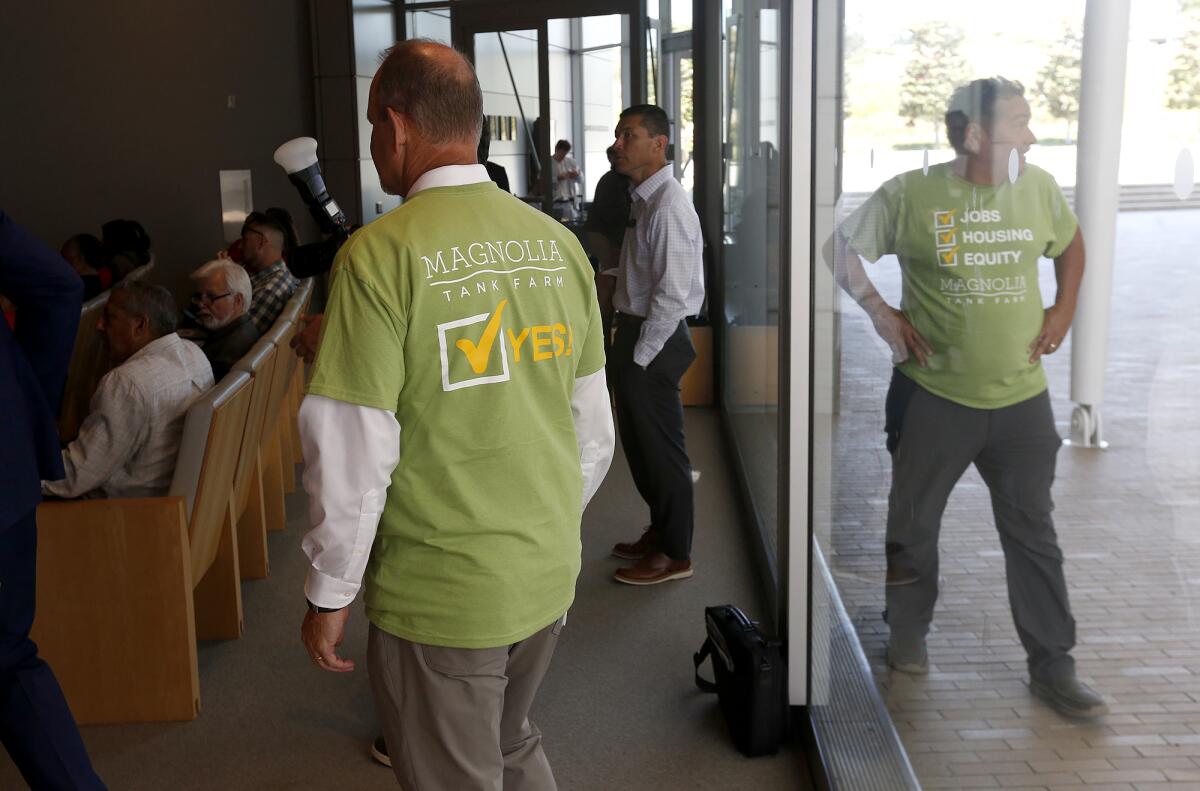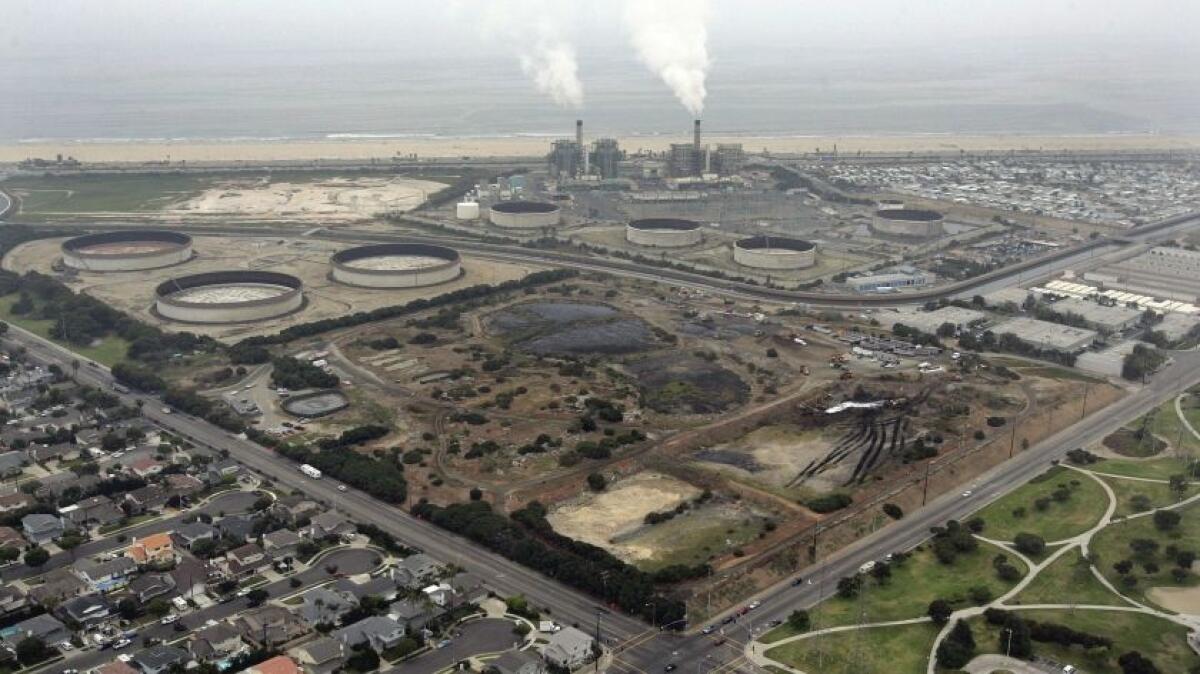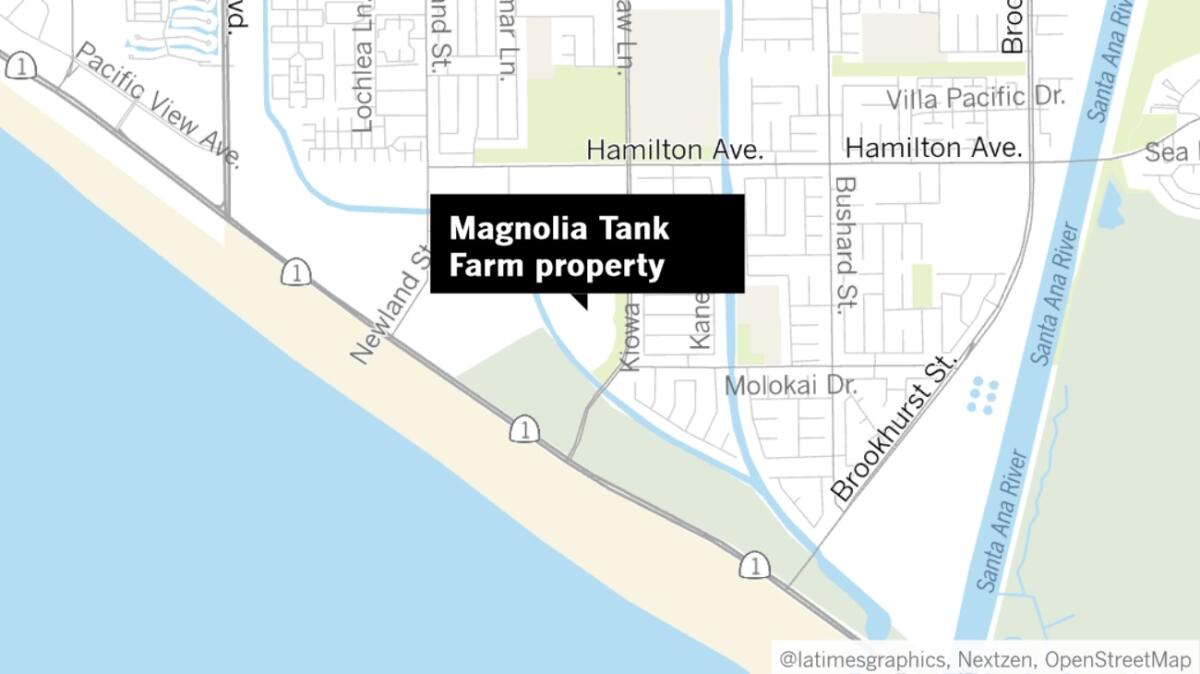Coastal Commission approves Magnolia Tank Farm housing project

The Magnolia Tank Farm project in Huntington Beach took a step forward Wednesday after the state Coastal Commission approved a land use amendment — a year after talks on the contested development project stalled.
“We are thrilled with the California Coastal Commission’s approval of our Huntington Beach project,” Shopoff Realty Investments chief executive Bill Shopoff said in a statement Thursday. “In addition to a hotel, this project will provide quality housing for Huntington Beach residents, with a much-needed affordable housing component, even including a first of its kind program that will dedicate a portion of the affordable housing to hotel workers. We believe this innovative program is vitally important to the success of this project, as it will allow workers to live in the city where they are employed, and avoid lengthy daily commutes.”

The 29-acre development was first approved by the Huntington Beach City Council in January 2021. The project was proposed for the lot bounded by the former ASCON landfill and Magnolia Street and necessitates rezoning the site from public uses and infrastructure to residential, commercial and open space in the city’s land-use plan to allow for mixed-use development.
As proposed, the project will include up to 250 medium-density residential units, a new hotel with market-rate and lower-cost rooms and new park and conservation open space, according to commission staff.
About 20% of the residential units will be affordable, roughly half of which will be reserved for income-qualifying employees for the hotel.
Of the hotel’s 215 rooms, roughly 25% will be designated as affordable, with rates set at 75% of the statewide peak season‘s daily average, with increases to be consistent with the consumer price index.

At its last review, Coastal Commission staff recommended denial of the amendment, as questions remained over how to address potential coastal impacts to the site, which is low-lying and faces risks of flooding caused by sea level rise, climate change and heavy rain. Concerns were also raised about possible contamination from the Ascon landfill, which is undergoing remediation under the jurisdiction of the California Department of Toxic Substances Control.
The city’s request was pulled in July 2023, then resubmitted in February of this year, with the addition of a technical study by consultant Q3 Consulting. The study indicated that existing flood walls that were recently improved could provide substantial protection against the elements, but they did not preclude the site from flooding entirely if a major storm surge combines with significant sea level rise.
The Coastal Commission moved to approve the amendments and implementation plans with modifications to both, requiring that adaptation measures be financed and implemented and that all occupants be notified of the possible risks.
Environmentalists and nearby residents have objected to the project for the same reasons the proposal was denied last year — that the site is hazardous and that construction would be disruptive to local wildlife.
Huntington Beach Councilman Casey McKeon, who said he lives in the southeast section of the city, agreed with the staff recommendation to not approve the amendment.
“I mentioned this earlier at the previous meeting, but this area already floods every rainy season. It’ll only be exacerbated if an elevated development is constructed here,” McKeon said. “Most importantly, I simply cannot fathom rezoning this property to allow for a more resident-heavy use with this location being adjacent to that Ascon ... site, which will never be fully remediated, and adjacent to an industrial power plant — let alone adjacent to the precious wetlands.”
McKeon said the questions, in his mind, were whether the Magnolia Tank Farm project would exacerbate issues at the Ascon site and how any new flooding infrastructure would be paid for.
Mauricio Escobar, a consultant and geologist on the project, said the tanks and supportive infrastructure were removed when Shopoff purchased the property in 2016. Escobar said the contaminated topsoil was removed in two major disposals, and it was determined, through subsequent testing and sampling, that the Magnolia Tank Farm site was fit for open use.
Opponents to the project stated they were not opposed to development but that the risks were too high with the site. Supporters, on the other hand, maintained that the Magnolia Tank Farm project would allow them to live closer to the hotels where they work and provide new housing opportunities for low-income workers.
One woman told commissioners the project would “drastically” improve her living circumstances, describing it as a rare opportunity.
Cynthia Gomez, who represents Unite Here Local 2, said the union was supportive of the project, as it would provide housing, green space, transportation and jobs.
“These are things working-class people desperately need access to. Hotel housekeepers, dishwashers, bellmen and cooks are faced with hours-long commutes because they can’t afford to live near their jobs at luxury resorts,” Gomez said. “This project not only proposes 250 units of housing with 51 lower-cost units, but it’s going to earmark a percentage of those units who will service guests next door.
“This is exactly the kind of development we need in coastal California, and working families should be able to benefit from it now.”
All the latest on Orange County from Orange County.
Get our free TimesOC newsletter.
You may occasionally receive promotional content from the Daily Pilot.




